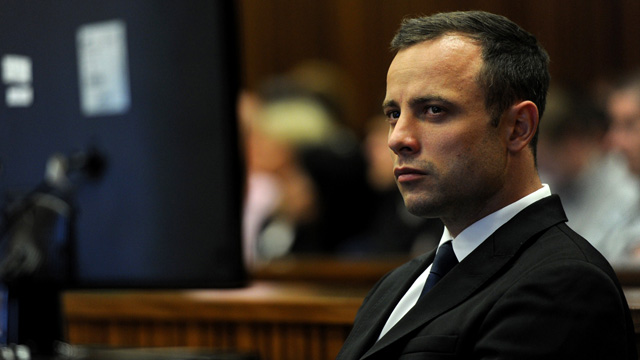Oscar Pistorius would be at risk of attack in South Africa’s violent jails, a defence witness has told the court on the second day of his sentence hearing.
Probation officer Annette Vergeer said the Paralympian would be particularly at risk as a double amputee.
The prosecution described earlier defence calls for a community service sentence as “shockingly inappropriate”.
[contextly_sidebar id=”SzRuhl0X5u8UVTFe9kNpdoUJi80UC7sl”]Pistorius has been found guilty of the culpable homicide of his girlfriend Reeva Steenkamp, but cleared of murder.
The defence is trying to show prison would be an inappropriate punishment.
On Tuesday Ms Vergeer – who was paid to work for the defence – said that without legs Pistorius would be “a lot more vulnerable than the normal man”.
She added that she had recently handled the case of an inmate who had been sexually assaulted in prison. “How can we say that he won’t be exposed to that?”
The athlete, she said, would “only deteriorate” in prison. “There is also no facility to cater for the accused’s disability.”

During cross-examination, prosecutor Gerrie Nel suggested Ms Vergeer’s claims about conditions in South African prisons were exaggerated as she had rarely visited them.
On Monday, he was angered by a call by another defence witness for the sentence to be house arrest and community service. Mr Nel labelled this a “shockingly inappropriate” punishment.
Pistorius faces up to 15 years in jail, although Judge Thokozile Masipa – who has been presiding over the trial in Pretoria – may suspend the sentence or impose a fine.
She said the athlete had acted negligently when he shot his girlfriend through a toilet door, but had genuinely thought her to be an intruder.
The sentencing hearing is expected to last several days.
Honorary doctorate
Early on Tuesday, the proceedings centred on Pistorius’ charity work.
Cross-examining one of the athlete’s managers, Peet Van Zyl, Mr Nel tried to show that the athlete’s honorary doctorate from the UK’s Strathclyde University was not for his charitable activities.
He suggested to Mr Van Zyl that sportsmen often took on such work for pragmatic reasons.
In 60 seconds: Key developments in the trial of Oscar Pistorius
Later the prosecutor questioned whether Pistorius had used his own funds to pay for prosthetics for disadvantaged young people.
However, Mr Van Zyl insisted that the athlete had asked for his speaking fees to be paid not to himself but to charity.
Defence counsel Barry Roux then continued the line of questioning about Pistorius’s motivation for his charity work.
The athlete’s manager said that while he had contractual obligations to his sponsors, he “went the extra mile” for disabled children.
The BBC’s Andrew Harding says Mr Nel has been trying to show Pistorius as a self-interested, corporate client rather than a selfless volunteer.
The Paralympic sprinter denies murdering Ms Steenkamp after a row on Valentine’s Day last year, saying he shot her by mistake.
Ms Steenkamp, a 29-year-old model and law graduate, was hit three times by bullets shot through a toilet door by Pistorius at his home in the capital, Pretoria.
Source: BBC


